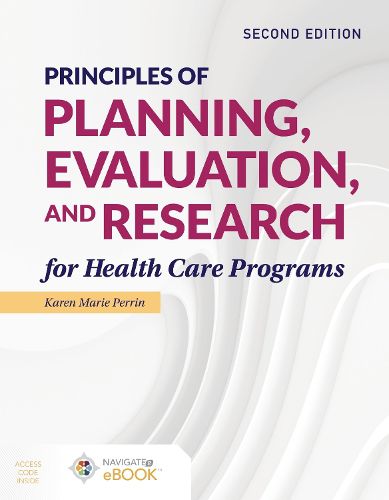Readings Newsletter
Become a Readings Member to make your shopping experience even easier.
Sign in or sign up for free!
You’re not far away from qualifying for FREE standard shipping within Australia
You’ve qualified for FREE standard shipping within Australia
The cart is loading…






Principles of Planning, Evaluation, and Research for Health Care Programs provides a basic understanding of the importance of and the key approaches used to conduct health program research and evaluations. The book also examines ethical and cultural competency issues unique to conducting evaluations. Additionally, it offers an introduction to systems thinking and its implications for evaluating the impact of interventions. Written with the undergraduate in mind, this book is ideal for students pursuing a wide spectrum of health careers. Through activities and case studies, readers will gain a solid foundation for understanding all aspects of evaluation while developing the critical thinking skills needed to dissect peer-reviewed publications as well as popular media health claims.
Key features - Comprehensively covers the the topics needed to review published literature, collect primary data, analyze data using basic statistics, and present results in written or verbal formats for their intended audiences. - Students will learn terminology, levels and types of measurement, data collection methods, sampling and basic statistical analysis. - New chapter on program planning that includes community partners, stakeholders, and useful models, such as MAP-IT. - Numerous examples and case studies, including additional ones on timely topics such as opioids, gun violence, mental health, and LGBTQ - New Critical Thinking boxes engage students and offer links to relevant YouTube videos.
$9.00 standard shipping within Australia
FREE standard shipping within Australia for orders over $100.00
Express & International shipping calculated at checkout
Principles of Planning, Evaluation, and Research for Health Care Programs provides a basic understanding of the importance of and the key approaches used to conduct health program research and evaluations. The book also examines ethical and cultural competency issues unique to conducting evaluations. Additionally, it offers an introduction to systems thinking and its implications for evaluating the impact of interventions. Written with the undergraduate in mind, this book is ideal for students pursuing a wide spectrum of health careers. Through activities and case studies, readers will gain a solid foundation for understanding all aspects of evaluation while developing the critical thinking skills needed to dissect peer-reviewed publications as well as popular media health claims.
Key features - Comprehensively covers the the topics needed to review published literature, collect primary data, analyze data using basic statistics, and present results in written or verbal formats for their intended audiences. - Students will learn terminology, levels and types of measurement, data collection methods, sampling and basic statistical analysis. - New chapter on program planning that includes community partners, stakeholders, and useful models, such as MAP-IT. - Numerous examples and case studies, including additional ones on timely topics such as opioids, gun violence, mental health, and LGBTQ - New Critical Thinking boxes engage students and offer links to relevant YouTube videos.